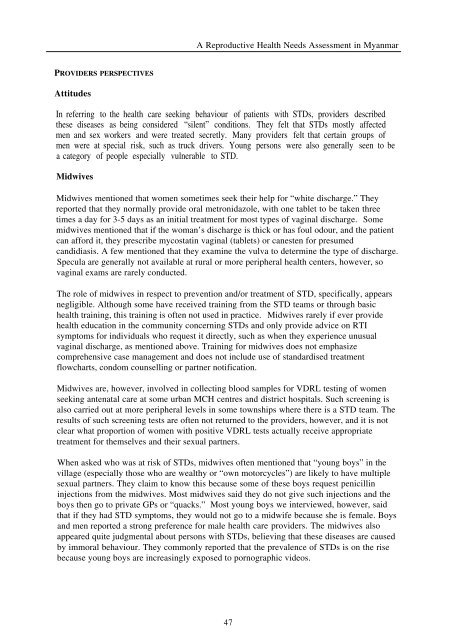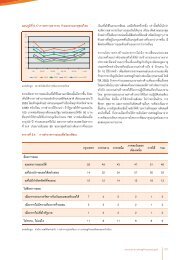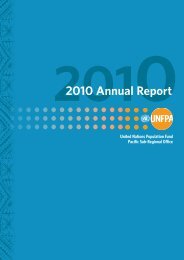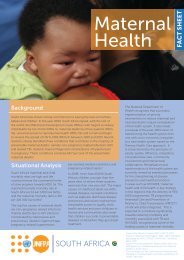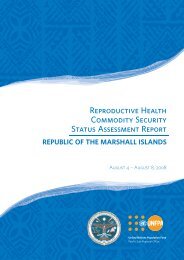A reproductive health needs assessment in Myanmar
A reproductive health needs assessment in Myanmar
A reproductive health needs assessment in Myanmar
Create successful ePaper yourself
Turn your PDF publications into a flip-book with our unique Google optimized e-Paper software.
A Reproductive Health Needs Assessment <strong>in</strong> <strong>Myanmar</strong><br />
PROVIDERS PERSPECTIVES<br />
Attitudes<br />
In referr<strong>in</strong>g to the <strong>health</strong> care seek<strong>in</strong>g behaviour of patients with STDs, providers described<br />
these diseases as be<strong>in</strong>g considered “silent” conditions. They felt that STDs mostly affected<br />
men and sex workers and were treated secretly. Many providers felt that certa<strong>in</strong> groups of<br />
men were at special risk, such as truck drivers. Young persons were also generally seen to be<br />
a category of people especially vulnerable to STD.<br />
Midwives<br />
Midwives mentioned that women sometimes seek their help for “white discharge.” They<br />
reported that they normally provide oral metronidazole, with one tablet to be taken three<br />
times a day for 3-5 days as an <strong>in</strong>itial treatment for most types of vag<strong>in</strong>al discharge. Some<br />
midwives mentioned that if the woman’s discharge is thick or has foul odour, and the patient<br />
can afford it, they prescribe mycostat<strong>in</strong> vag<strong>in</strong>al (tablets) or canesten for presumed<br />
candidiasis. A few mentioned that they exam<strong>in</strong>e the vulva to determ<strong>in</strong>e the type of discharge.<br />
Specula are generally not available at rural or more peripheral <strong>health</strong> centers, however, so<br />
vag<strong>in</strong>al exams are rarely conducted.<br />
The role of midwives <strong>in</strong> respect to prevention and/or treatment of STD, specifically, appears<br />
negligible. Although some have received tra<strong>in</strong><strong>in</strong>g from the STD teams or through basic<br />
<strong>health</strong> tra<strong>in</strong><strong>in</strong>g, this tra<strong>in</strong><strong>in</strong>g is often not used <strong>in</strong> practice. Midwives rarely if ever provide<br />
<strong>health</strong> education <strong>in</strong> the community concern<strong>in</strong>g STDs and only provide advice on RTI<br />
symptoms for <strong>in</strong>dividuals who request it directly, such as when they experience unusual<br />
vag<strong>in</strong>al discharge, as mentioned above. Tra<strong>in</strong><strong>in</strong>g for midwives does not emphasize<br />
comprehensive case management and does not <strong>in</strong>clude use of standardised treatment<br />
flowcharts, condom counsell<strong>in</strong>g or partner notification.<br />
Midwives are, however, <strong>in</strong>volved <strong>in</strong> collect<strong>in</strong>g blood samples for VDRL test<strong>in</strong>g of women<br />
seek<strong>in</strong>g antenatal care at some urban MCH centres and district hospitals. Such screen<strong>in</strong>g is<br />
also carried out at more peripheral levels <strong>in</strong> some townships where there is a STD team. The<br />
results of such screen<strong>in</strong>g tests are often not returned to the providers, however, and it is not<br />
clear what proportion of women with positive VDRL tests actually receive appropriate<br />
treatment for themselves and their sexual partners.<br />
When asked who was at risk of STDs, midwives often mentioned that “young boys” <strong>in</strong> the<br />
village (especially those who are wealthy or “own motorcycles”) are likely to have multiple<br />
sexual partners. They claim to know this because some of these boys request penicill<strong>in</strong><br />
<strong>in</strong>jections from the midwives. Most midwives said they do not give such <strong>in</strong>jections and the<br />
boys then go to private GPs or “quacks.” Most young boys we <strong>in</strong>terviewed, however, said<br />
that if they had STD symptoms, they would not go to a midwife because she is female. Boys<br />
and men reported a strong preference for male <strong>health</strong> care providers. The midwives also<br />
appeared quite judgmental about persons with STDs, believ<strong>in</strong>g that these diseases are caused<br />
by immoral behaviour. They commonly reported that the prevalence of STDs is on the rise<br />
because young boys are <strong>in</strong>creas<strong>in</strong>gly exposed to pornographic videos.<br />
47


